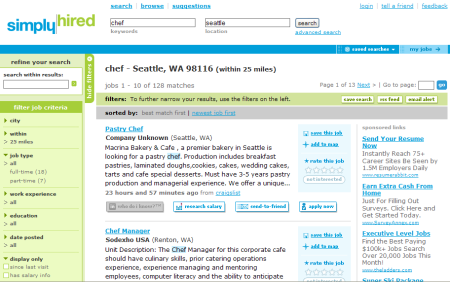Developing a mashup can be
a lot of fun and it’s usually low cost, because you’re using (semi) open tools and data.
Forget fun though for a minute – is there a business in mashups? There are obvious
benefits for the data providers, for example both Google and craigslist benefit from
increased traffic to their sites. In most cases that leads to increased revenue as well.
But what’s in it for the mashup developer, apart from publicity and prestige?

Findory developer Greg Linden listed
some problems with mashups as a business on his blog near the end of 2005. He noted
that mashups have no service guarantees, there are usually limits on the queries of APIs
and limits on commercial use of the APIs, mashups can be numbingly slow, and there are no
barriers to entry.
Although Greg concluded that “there is no business model for mashups”, in fact there
are a number of ways in which mashup developers can monetize their products. The most
obvious is advertising.
Advertising
Simplyhired.com is a ‘vertical search for jobs’ mashup, getting data from job boards, company pages, online classifieds, and other data sources. It also mashes in Google Maps,
LinkedIn and PayScale.com. When a user searches for a job – say, a chef position in
Seattle – they not only get a list of available chef jobs in Seattle, but on the right of
the results are “sponsored listings”

I assume SimplyHired has agreements with the data owners, in which they licence access
to the data for commercial means (if anyone can confirm that, please do in the comments).
In any case I expect SimplyHired is earning a tidy sum with onsite advertising, because
the results are highly contextual and job-seekers would probably be tempted by “send your
resume now” ads.
Lead generation and affiliate programs
Another potential business
model for mashups is lead generation and/or affiliate programs. Adam Trachtenberg, a
developer from eBay, developed a mashup called Dude, Where’s My Used Car? (previously
known as ‘eBay Motors & Google Maps’). It is a mashup of data from eBay Motors
listings and – you guessed it – Google Maps, using the APIs of those two companies. What
it does is enable users to find vehicles for sale in a location near them. The data in
this mash-up is not stored on the host’s server, unlike with Housing Maps for example, but is served up in real
time.

Explaining his mashup at the 2005
Web 2.0 Conference, Adam said it gave the user experiences they wouldn’t normally get
on eBay – primarily the visual mapping experience. But crucially the mashup still does a
lot of things users can do on the eBay website, for example adding a watchlist onto their
eBay profile.
There is also an eBay affiliate program,
which is a possible source of revenue for Adam in the future. As of writing, he hasn’t
implemented the affiliate feature – noting in his To Do list that he needs to add
Affiliate link tracking and more information on eBay Developers and Affiliate
Programs.
How would the affiliate program work? Well this mashup essentially creates lead
generations for eBay, because all results are directed to the eBay Motors website for
details on purchasing the vehicle. It’s similar to how HousingMaps directs users to
craigslist to complete their transaction. Except that eBay actually has an affiliate
program, which would allow Adam to earn a kind of ‘lead generation’ fee each time a user
clicks through to eBay Motors and completes a transaction.
Transactional mashups
As mashups mature, we will probably see more examples of ‘transactional’ mashups –
i.e. full-fledged web applications in which users can not only view (read) mashed up
data, but do transactions with that data within the mashup.
Taking the eBay Motors example above, what if users could actually complete the
purchase of a car from within the mashup itself – instead of being directed to the eBay
website. The value would remain the same for eBay, who get the same cut of the action.
Indeed they may find purchases increase, because the user can do everything from the one
place (the mashup site). It would almost certainly mean more value for the mashup,
because users would be able to do more things on the mashup site – which gives more
monetization opportunities (e.g. advertising).
In an
August 2005 blog post Technology VC Peter Rip speculated that advertising networks
such as Google and Yahoo/Overture will eventually create “settlement network models” to
enable transactional mashups. While he was talking specifically about advertising
networks, there is no reason why this model can’t be extended to web applications such as
eBay Motors. The elements of a settlement network model would initially be:
“…bundling (1) contracts to police gaming and (2) payment settlement systems to
enable the shared value model…”
Enabling transactions in mashups extends to enterprise applications too. In January
2006 Phil Wainewright wrote about a
company called NetSuite, a
provider of CRM software. NetSuite stores transactional data, such as orders and stock
levels, which according to CEO Zach Nelson “makes it a natural choice for creating
composite applications – or mashups, as the Web x.0 generation has it – with other
services.”
Other business models
Other possible business models for mashups include:
- subscriptions
- pay-per-transaction
- premium services
- charging businesses but not individuals
- etc.
None of these business models I’ve outlined here has yet been fully proven. But then it can fairly be said that business models
for mashups in general are still being explored and there are no easy monetization
answers yet.
Flickr pics: The first one is by ancawonka, from the
Yahoo! party at eTech 06. The second Flickr pic is by Dave McClure, from the 2005
Web 2.0 Conference session on mashups (which I attended). Pictured are eBay’s Adam
Trachtenberg, Yahoo’s Jeffrey McManus and Google/HousingMap’s Paul Rademacher.

















